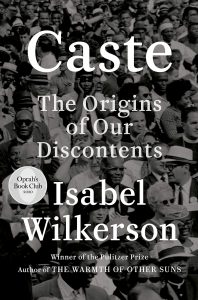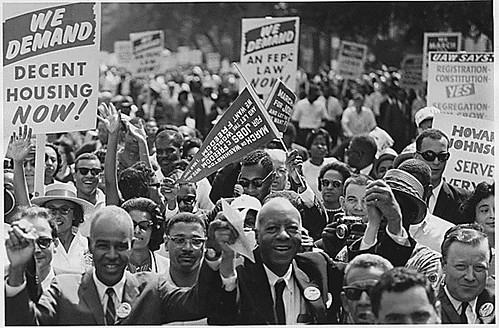A Response to Caste by Isabelle Wilkerson
 By Mike Greenwood
By Mike Greenwood
Sometimes I can approach a book naively as I did with Isabelle Wilkerson’s Caste. As I reserved the book from my local library, I remember thinking that “caste” is something I know happens in India but here, where I live? No way. Little did I realize or anticipate that I would be challenged again and again with her provocative premise that there is an unspoken caste system in the United States of America.
Caste was not a comfortable read especially given I read it in the context of Black Lives Matter vigils and protests, the trials of police offers who were acquitted of killing black men and women, and the reckoning by a lot of white folks that we have ignored systematic racism in our institutions and policies.
In the context of this crisis, Isabel Wilkerson laid out a case for systematic classism by identifying eight underlying pillars of a caste system and using examples, often from her own life, of how they operated in Nazi Germany, in India and within the United States. Allow me to share two of the multitude of examples she provides in her 496-page book:
- Nazi Germany was looking internationally for laws to protect and promote the “superior” Aryan race, and identified an ideal model for their legal justification of bigotry and eventual killings – the United States of America and our Jim Crow laws. Wilkerson notes that even the German researchers from that time were “confounded by the lengths to which America went to segregate its population.”
- Alongside tracing the history of caste Wilkerson traces the notion of race, because, as she explains, race is about caste. “Race does the heavy lifting for a caste system that demands a means of human division. Until the birth of the new nation of The United States of America, no one had heard of the word ‘black’ as a race. No one in Africa. Everyone there is African.” She adds that when, “People do cruel things against a person of different colour for no other reason than the colour – that’s racism. People who do cruel things to others in order to ‘put them in their place’ – that’s casteism.”
At times, I thought Wilkerson dwelled too much on how Trump and Republican policies supported our caste system. But reflecting back on my reading of Caste, after the January 6th insurrection, I understand why she did. Many of those policies kept a small minority encased in power and influence through their status and wealth. Finally, several months after reading Caste, I continue to question much which I never questioned before – questions as to how our laws, polices and white supremacy all support the walls of our caste system.
One Congregation’s Response to Classism Workshops
By Michael Greenwood
Champlain Valley Unitarian Universalist Society, Middlebury, Vermont
During the years between 2015 and 2017, the Champlain Valley Unitarian Universalist Governing Board sponsored two Class Conversation workshops, “Organizing for Change: Addressing Classism In Your Faith Community” and “Create Justice- Not Walls: Class and Race in UU Settings.” Later, the congregation sponsored the worship service, Born on Third Base led by Chuck Collins author of the book of the same title.
As a result congregational members examined our policies, practices and norms. For example, from the minister to the sexton, we examined the equity of what we offered our employees. Were we equitable in our wages and more importantly the benefits we offered? Was “passing the plate” an embarrassing component of the Sunday service? We noticed who was missing at our events – pay for dinners, the auction- and wondered why.
During the years between 2015 and 2017, the Champlain Valley Unitarian Universalist Governing Board sponsored two Class Conversation workshops, “Organizing for Change: Addressing Classism In Your Faith Community” and “Create Justice- Not Walls: Class and Race in UU Settings.” Later, the congregation sponsored the worship service, Born on Third Base led by Chuck Collins author of the book of the same title.
In response, our minister Barnaby Feder with other key individuals in the congregation instituted the following changes.
- We made childcare an integral offering for every committee and small group meeting thus enabling single parents and families to attend without having to worry about providing childcare. This allowed them to participate in our congregational life outside of Sunday service.
- We shared our personal stories from the pulpit of how we had moved from one class background to another e.g. working to professional middle class or vice-versa from professional class to working class. The sharing of these personal stories dispelled the myth that even though we are a largely affluent white congregation in a well respected liberal arts college town not all of us were professionals earning a comfortable income with generous benefits.
Because these stories were public, it created a culture of inclusion – “there is no shame to your economic status as others share that experience with you.”
- We moved away from charging and advertising discounts for families in order to attend communal meals and concerts. If a donation was needed to offset costs, a “free will” donation box was left to side of the entry door.
- Perhaps the most significant change we made was ending our annual auction fundraiser where the highest bidder wins. Instead we did a Radical Love Giveaways event. Raffle items were displayed on a table with a collection container where tickets could be deposited. Every family unit received 10 tickets to deposit wherever they wished – weekend vacations, dinners, a midnight snowshoeing event, a watercolor, etc. How did this event work as a fun-raiser? Participants were asked to give 4% of their annual pledge. But everyone received their 10 tickets and the equal chance of winning that dinner or weekend get-away regardless if they contributed that 4% or not.
To be sure our work has just begun. But I, along with many others, look forward to finding ways to be more inclusive as an integral part of our personal and spiritual growth.
Unity Based on Justice
 In July of 2020, UU Class Conversations published the blog post The Time to Unite as One America is Now about police brutality and the systemic oppression of Black and other people of color throughout the United States. It focused on how the deaths of black and brown men and women by police officers sparked international protests. The protesters were labelled terrorists, thugs and unpatriotic by some conservative media outlets and politicians.
In July of 2020, UU Class Conversations published the blog post The Time to Unite as One America is Now about police brutality and the systemic oppression of Black and other people of color throughout the United States. It focused on how the deaths of black and brown men and women by police officers sparked international protests. The protesters were labelled terrorists, thugs and unpatriotic by some conservative media outlets and politicians.
Just a few weeks earlier, some of the same media outlets and politicians had proffered a very different response when heavily armed, mostly White, protesters stormed the Michigan capitol building, threatening to kidnap and possibly kill the governor. Why? The rioters were upset about stay-at-home orders during a pandemic.
These protesters were called patriots. Police stood down, the National Guard was not called in to quell the unrest, and there were no arrests, no tear gas deployed, and no curfews imposed and enforced. Both times Americans were exercising their First Amendment rights. Yet, there were very different outcomes and consequences for those protesting.
Down a Dangerous Road
Well, fast-forward less than six months later and due to a steady stream of falsehoods and conspiracy theories from politicians, including the lame duck U.S. president about the legitimacy of the presidential election, a mob of armed white supremacists were incited to attempt an insurrection of another American Capital building. The intent was the same: Harm the legislature, including the vice president, speaker of the House and members of the House and the Senate. This time, the riot was deadly and dozens of police officers were injured and six people have died: All this in America.
Using Racial Tropes to Obscure Class
Why? Well, the idea that real Americans can only look a certain way and cannot be immigrants or people of color or a different religion. Many Americans overwhelmingly ignore the fact that class inequalities are not just part of the black or brown experience but a struggle for all Americans who are low-income or working class. This is increasingly true also for middle class people. This ingrained belief keeps many lacking class privilege from joining others of a different race or religion and undercuts any potential unity across racial lines.
There is little self-reflection for most Americans on how their class differences shape their backgrounds and unique attitudes and behaviors. Few consider how these class differences actually can bridge racial and religious divides, if explored. The class designation is overshadowed by the ever-present racial divide. So much so that economic initiatives often proposed by progressive or moderate politicians are viewed as handouts or bailouts by certain Americans. Stimulus checks, for example, are considered nonessential because they would go to the undeserving.
The idea that those with less class advantage are lazy is often intentionally conflated as coded messages about immigrants and people of color and creates an us versus them paradigm. Imagine, if people living in poverty and those in the working and middle class actually recognized that their commonalities outweigh their differences?
Our Truth
Some White poor and working class people continue to believe that they have more in common with others of their race who have substantial class privilege than they do with black and brown people of limited privilege. They have bought the idea that the We (Whites of all classes) have to stick together to protect our country, our flag, our families and our country’s traditions as Whites – despite economic differences. It’s imperative, or the them will take over, and as the neo-Nazi chant in Charlottesville suggested, they will erase us.
The idea that the votes of people of color are less legitimate than those of Whites is a shameful part of American history that is still alive and why insurrectionists carried Confederate flags through the Capital buildings during both riots.
With the current (and much-needed) focus on racial differences, Americans overwhelmingly are unable to recognize class and classism. Moreover, American economic and political systems that widen the income gap are rarely challenged in substantive ways. The status quo is the gold standard, and U.S. policies and practices routinely benefit the wealthy and affluent at the expense of other Americans.
Until we as a nation wake up and realize that the status quo is not working for most Americans, we are destined to routinely make the same choices that continue to divide us. And, if the latest insurrections teach us anything, there is a growing angry and violent group of Americans who, if not addressed, are intent on ripping the country apart.
But there is much cause for hope in the coming months. The end of the coronavirus – while still distant – is finally in sight. The fervor of the racial justice movement is still high. New federal leadership has said it is committed to addressing class inequities and white supremacy. So, in our UU congregations and organizations let’s heighten the meaningful dialogue – and act upon – racial and class justice.
Why I Volunteer
| By Elizabeth Cogliati
We don’t talk about money in this country enough. It is still a taboo topic. We also don’t talk about the ways in which money, and the lack thereof, affect people’s lives and their opportunities. Class is related to the cumulative effects of money and no money. We definitely do not talk enough about class, and how it affects people’s experiences of Unitarian Universalism. I want to encourage all of us to talk more about class, and money, and the effects they have on our congregants and our congregations. I think it is especially important to discuss this from a young age, and incorporate it into our religious education classes for children and youth. |

